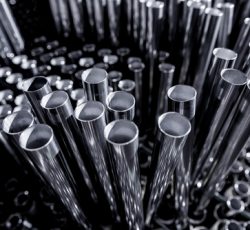 Metal fabrication is a diverse and dynamic field that involves the transformation of raw metal materials into a wide range of products. One of the key aspects of metal fabrication is selecting the appropriate material for a particular application. Different metals offer distinct properties, characteristics, and advantages, making them suitable for specific uses. In this blog, we will dive into the various materials used in metal fabrication, providing readers with a comprehensive understanding of their properties and applications.
Metal fabrication is a diverse and dynamic field that involves the transformation of raw metal materials into a wide range of products. One of the key aspects of metal fabrication is selecting the appropriate material for a particular application. Different metals offer distinct properties, characteristics, and advantages, making them suitable for specific uses. In this blog, we will dive into the various materials used in metal fabrication, providing readers with a comprehensive understanding of their properties and applications.
Steel:
Steel is one of the most commonly used materials in metal fabrication due to its strength, versatility, and affordability. It is an alloy composed mainly of iron with varying amounts of carbon and other elements. The carbon content determines the strength and hardness of the steel, making it suitable for a multitude of applications. From structural components in buildings and bridges to automotive parts, steel is widely used across various industries. It can be easily manipulated through cutting, bending, and welding, making it an ideal choice for fabricators.
Aluminum:
Aluminum is a lightweight metal that offers excellent corrosion resistance and high strength-to-weight ratio. It is widely used in metal fabrication applications where weight reduction is important, such as in the aerospace, automotive, and marine industries. Aluminum is also highly malleable, allowing it to be formed into complex shapes and designs. Additionally, it can be easily machined, welded, and finished, making it a versatile material for a wide range of applications.
Stainless Steel:
Stainless steel is a corrosion-resistant alloy that contains a high percentage of chromium. This material is known for its durability, aesthetic appeal, and sanitary properties, making it suitable for applications requiring hygiene and resistance to rust and stains. Stainless steel is commonly used in the food and beverage industry, pharmaceuticals, and kitchen appliances. It is also a popular choice for architectural and decorative elements due to its attractive appearance and low maintenance requirements.
Copper:
Copper is a highly conductive metal that offers excellent electrical and thermal properties. It is commonly used in electrical wiring, plumbing systems, and heat exchangers. Copper is not only a good conductor of electricity but also resistant to corrosion and weathering. It can be easily formed and soldered, making it a popular choice for plumbing fittings and electrical connectors. Additionally, copper’s distinct reddish color lends itself well to artistic and decorative applications.
Brass:
Brass is an alloy composed primarily of copper and zinc, with small amounts of other elements. It is valued for its attractive gold-like appearance, low friction properties, and high corrosion resistance. Brass is commonly used in applications where both aesthetic appeal and functionality are important, such as musical instruments, plumbing fixtures, and decorative hardware. It is also easily machined and joined, making it a versatile material for fabricators.
Titanium:
Titanium is a lightweight and exceptionally strong metal known for its high tensile strength and corrosion resistance. It is widely used in industries that require materials with excellent strength-to-weight ratios, such as aerospace, automotive, and medical devices. Titanium’s high resistance to corrosion makes it suitable for applications exposed to harsh environments, such as marine and chemical processing industries. However, due to its higher cost and challenging machining properties, titanium is typically used for specialized applications that require its unique properties.
Summary:
The choice of material plays a critical role in metal fabrication, as it determines the functionality, durability, and cost-effectiveness of the final product. Steel, aluminum, stainless steel, copper, brass, and titanium are just a few examples of the diverse range of materials used in metal fabrication. Each material offers unique properties and advantages that make them suitable for specific applications. By understanding the characteristics and applications of these materials, fabricators can select the ideal material for each project, ensuring the production of high-quality and fit-for-purpose metal products.
Need a Machine Shop in Atmore, AL?
Escofab Inc. has been dedicated to providing quality machining and fabrication since 1981! Here at Escofab Inc. we utilize fabricating and machining to your specifications. We work to fit your needs and ensure customer satisfaction. Our friendly and informative staff are eager to assist you! Give us a call or come on in today; walk-ins welcome!
